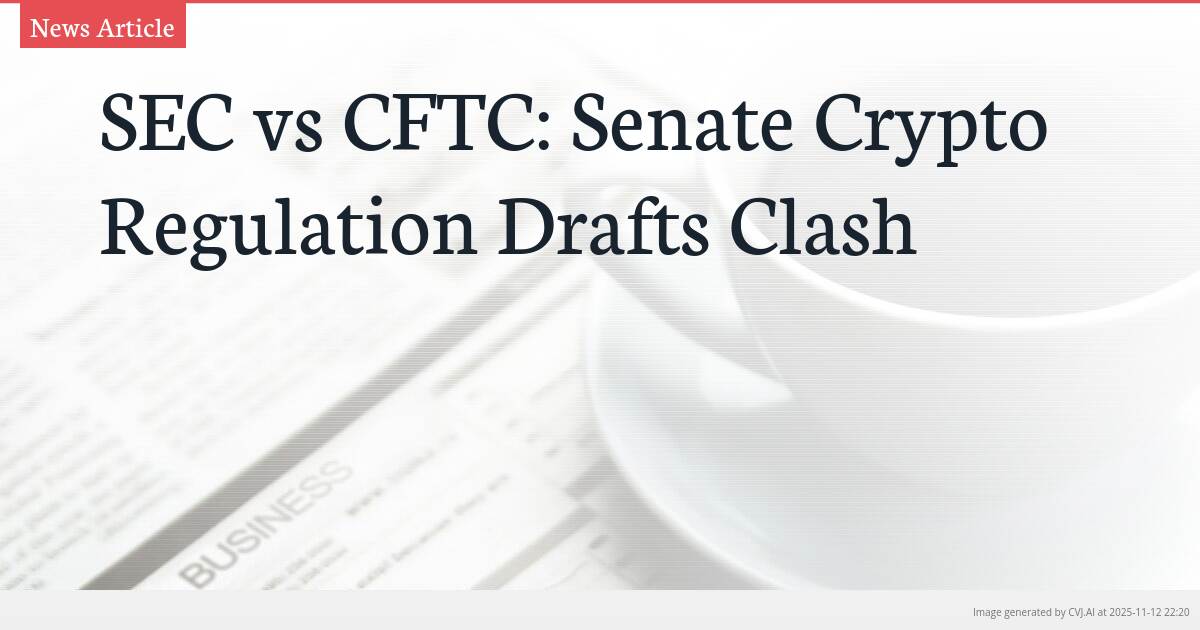This summary text is fully AI-generated and may therefore contain errors or be incomplete.
Introduction
The U.S. Senate is advancing two competing regulatory frameworks that would fundamentally reshape cryptocurrency oversight. One proposal expands CFTC authority over digital commodities, while the other creates new SEC powers over hybrid assets, setting up a jurisdictional battle that could determine the future of crypto markets.
Key Points
- The Agriculture Committee draft would require Bitcoin platforms to register as digital-commodity exchanges under CFTC oversight with new capital and custody rules
- The Banking Committee proposal introduces an 'ancillary asset' category that allows tokens to exit SEC securities treatment once they achieve sufficient decentralization
- Both approaches could force centralized exchanges to adopt dual registration, splitting oversight between CFTC for spot trading and SEC for securities instruments
The Agriculture Committee's CFTC-Focused Framework
The Senate Agriculture Committee’s draft legislation, championed by Senators John Boozman and Cory Booker, represents a significant expansion of the Commodity Futures Trading Commission’s authority over digital assets. This framework would grant the CFTC explicit jurisdiction over “digital commodities” and their spot markets, establishing a comprehensive registration system for exchanges, brokers, and dealers that mirrors the agency’s oversight of traditional commodities markets. The proposal builds upon the House-passed Digital Asset Market Clarity Act of 2025, creating a regulatory structure that would bring U.S. Bitcoin platforms under direct CFTC supervision.
Under this framework, Bitcoin spot markets would undergo a fundamental transformation. U.S. Bitcoin platforms would be required to register as digital-commodity exchanges, meeting new capital requirements and implementing stricter custody rules that mandate the use of qualified custodians and segregation of customer assets. The legislation specifically prohibits conflicts of interest with affiliates, addressing concerns about commingling of funds that have plagued some cryptocurrency exchanges. This shift to CFTC oversight would emphasize market surveillance and transparent reporting over the investor disclosure requirements typically associated with SEC regulation.
The Agriculture Committee’s approach includes provisions for joint CFTC-SEC rulemaking for entities with overlapping responsibilities, though it leaves complex issues like decentralized finance (DeFi) for future consideration. While the CFTC would gain authority over spot markets, the SEC would retain jurisdiction over securities instruments and crypto futures, ensuring that dual oversight remains a feature of the regulatory landscape. The proposal could standardize data sharing across trading venues, potentially improving the surveillance capabilities that ETF issuers rely on for market analysis.
The Banking Committee's SEC-Centric Approach
Across the Capitol, the Senate Banking Committee’s Responsible Financial Innovation Act takes a markedly different approach by focusing on digital assets that straddle the line between securities and commodities. The draft introduces the concept of “ancillary assets” – defined as fungible digital commodities distributed through arrangements that constitute investment contracts. This classification would give the SEC explicit authority over these hybrid instruments, requiring issuers to provide comprehensive disclosures covering token distributions, governance structures, and associated risks.
The Banking Committee’s proposal creates a structured pathway for tokens to potentially graduate from securities treatment through a decentralization certification process. Under this framework, tokens linked to “active projects” like Ethereum could begin under SEC oversight but later transition out of securities regulation once network control falls below specific thresholds. The legislation gives the SEC approximately two years to finalize rules defining what constitutes an “investment contract” and requires the agency to articulate in writing what decentralization means, moving away from the ad hoc enforcement approach that has characterized SEC actions in the crypto space.
This framework establishes clearer practical distinctions between different types of digital assets. Bitcoin would likely be treated as a digital commodity under CFTC jurisdiction, while tokens with enterprise ties would remain under the SEC’s ancillary-asset regime until they can demonstrate sufficient decentralization. The proposal represents the most significant attempt to date to resolve the regulatory uncertainty that has persisted since the SEC’s 2017 DAO report, providing both regulatory clarity and a potential exit strategy for projects seeking to operate outside securities laws.
Practical Implications for Crypto Markets
The competing Senate drafts would force significant operational changes across the cryptocurrency industry, particularly for centralized exchanges that would face the prospect of dual registration. Under either framework, exchanges would need to register as CFTC digital-commodity exchanges for spot crypto trading while remaining subject to SEC oversight for listed securities. This bifurcated approach could compel U.S. platforms to adopt stricter capital requirements, implement more transparent trading books, and rebuild internal compliance firewalls to accommodate both regulatory regimes.
The regulatory divergence between the two approaches would create distinct market dynamics. The CFTC-focused Agriculture Committee draft emphasizes market quality and liquidity transparency, potentially giving analysts and traders better insight into Bitcoin market structure. Meanwhile, the SEC-centric Banking Committee approach prioritizes investor protections and disclosure requirements, creating a more structured environment for token projects seeking regulatory certainty. Both frameworks would enhance custody requirements and market surveillance, though they approach these objectives through different regulatory philosophies.
Timing and implementation remain critical unknowns in the regulatory equation. The Banking Committee’s draft imposes specific deadlines for rulemaking, while the Agriculture Committee’s proposal leaves key questions unresolved, relying on future coordination between agencies and public consultations. With the House version already passed and opposition emerging within both political parties, the final regulatory framework remains uncertain. What is clear is that the classification decisions emerging from this legislative process will directly impact liquidity, custody arrangements, and compliance costs across the digital asset ecosystem.
📎 Read the original article on cryptoslate.com

